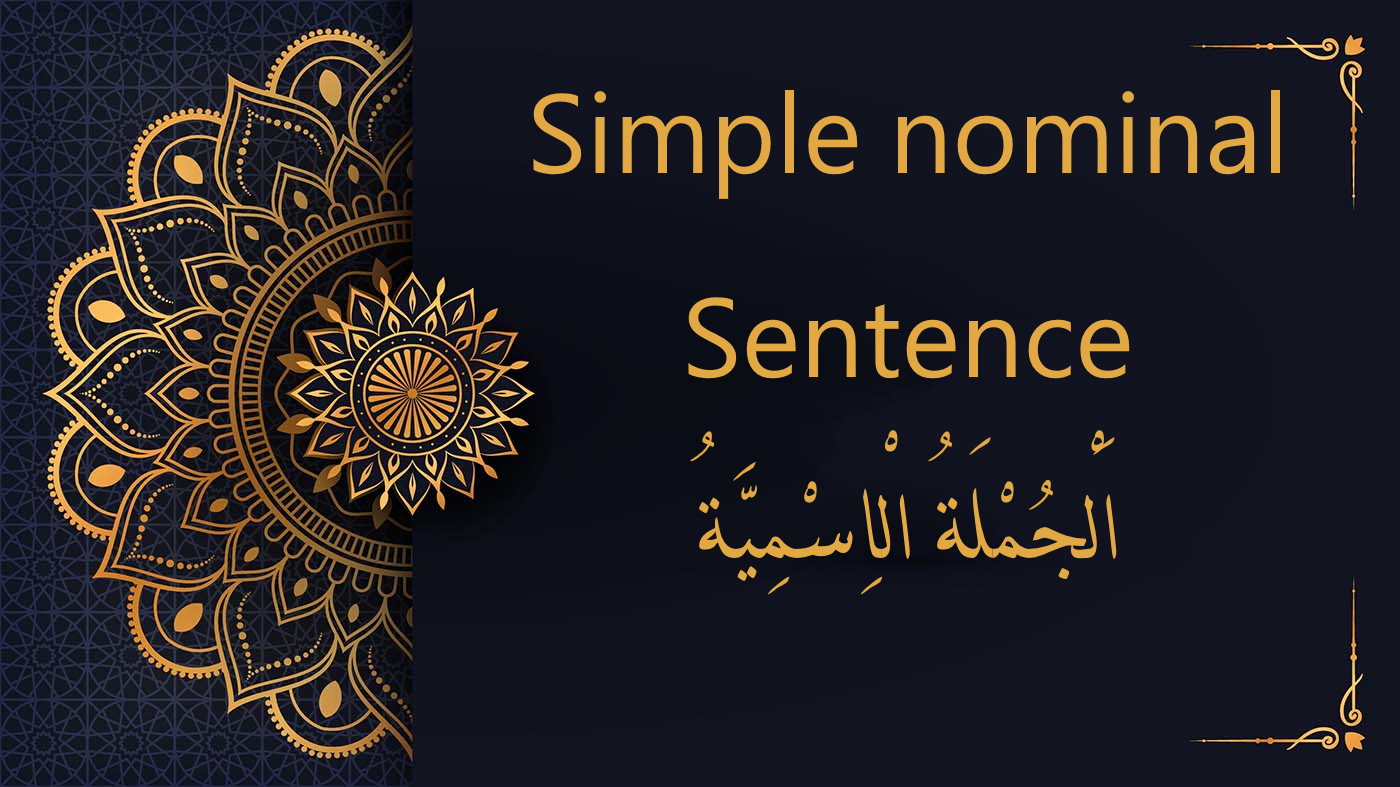Simple Nominal Sentence in Arabic – الجُمْلَةُ الاسْمِيَّة – Arabic free Course

Simple Nominal Sentence in Arabic - الجُمْلَةُ الاسْمِيَّة
Introduction
In Arabic nominal sentences, two primary elements are present: the subject and the predicate. The subject is termed as ‘اَلْمُبْتَدَأُ’, while the predicate is referred to as ‘اَلْخَبَرُ’. Consider the sentence: ‘مُحَمَّدٌ رَسُولٌ’, translated as ‘Muhammad is a messenger.’ In this instance, ‘مُحَمَّدٌ’ acts as the subject (اَلْمُبْتَدَأُ), and ‘رَسُوْلٌ’ serves as the predicate (اَلْخَبَرُ).
“In this instance, ‘اللَّـهُ’ functions as the subject (اَلْمُبْتَدَأُ), while ‘سَمِيعٌ عَلِيمٌ’ stands as the predicate (اَلْخَبَرُ)
1. The subject - اَلْمُبْتَدَأُ
The subject (اَلْمُبْتَدَأُ) is typically a proper noun (المَعْرِفَةُ). If not inherently proper, it is particularized by prefixing with the article ‘ال’. Example: اَلْقُرْآنُ كِتَابٌ translates to ‘The Qur’an is a book.’ In the nominative case, the subject and predicate must agree in number and gender. Illustration:
وَأَنتُمْ ظَالِمُونَ
while you were wrongdoers. (2:92)
The subject (اَلْمُبْتَدَأُ) in a nominal sentence can be represented by a single word or an entire phrase. However, it’s crucial to note that the subject cannot be constituted by a verb or a genitive construction.
Consider the following examples:
إِنَّ أَكْرَمَكُمْ عِندَ اللَّـهِ أَتْقَاكُمْ
Indeed, the noblest of you in the sight of Allah is the most righteous of you. (49:13)
2. The predicate - اَلْخَبَرُ
A. It is always a common noun (النَكِرَةُ)
The subject is consistently an indefinite noun (النَكِرَةُ). As for the predicate (اَلْخَبَرُ):
- It adopts the nominative case (مَرْفُعٌ).
- Generally, it aligns with the subject in terms of number (be it singular, dual, or plural) and gender (either masculine or feminine).
- However, when the predicate is a broken plural referring to non-living entities (غَيْر عاقِل), it will take a feminine singular form.
Consider the following examples:
فَتِلْكَ بُيُوتُهُمْ خَاوِيَةً بِمَا ظَلَمُوا
So those are their houses, desolate because of the wrong they had done. (27:52)
B. Proper Nouns as Predicates: When اَلْخَبَرُ Isn't an Adjective
When the Predicate (اَلْخَبَرُ) is a Proper Noun and Not an Adjective. For example:
أَنتَ مَوْلَانَا
You are our protector (2:286)
أَنتَ is the subject – اَلْمُبْتَدَأُ and مَوْلَانَا is the predicate – اَلْخَبَرُ
قَالَ أَنَا يُوسُفُ وَهَـٰذَا أَخِي
I am Joseph, and this is my brother (12:90)
C. Using Detached Pronouns with Proper Noun Predicates in Nominal Sentences
In Arabic grammar, when structuring a nominal sentence with a predicate that is a proper noun, it’s customary to insert a detached pronoun between the subject and the predicate. This pronoun serves as a connector, and its form will mirror the subject in both gender and number, ensuring harmony and clarity within the sentence structure. This practice not only enriches the linguistic texture but also underscores the relationship between the subject and the predicate.
وَأُولَـٰئِكَ هُمُ الْمُفْلِحُونَ
and it is those who are successful. (2:5)
D. Versatility of the Predicate (اَلْخَبَرُ): From Words to Phrases and Sentences
Enhance and expand: “اَلْخَبَرُ,” known as “Al-Khabar” in Arabic grammar, serves as the predicate in a sentence. The predicate, or “الخبر,” can take the form of a single word, a phrase, or even an entire sentence. Furthermore, it has the flexibility to manifest as a genitive phrase, providing a rich and versatile structure for conveying information within Arabic sentences. This fundamental grammatical concept plays a crucial role in constructing meaningful and coherent Arabic sentences.
الْحَمْدُ لِلَّـهِ رَبِّ الْعَالَمِينَ
[All] praise is [due] to Allah, Lord of the worlds – (1:2)
وَإِلَـٰهُكُمْ إِلَـٰهٌ وَاحِدٌ
And your god is one God. (2:163)
E. the Predicate and the Pronoun
When the predicate takes the form of a sentence, it employs a pronoun that specifically indicates the subject.
For example:
الَّذِينَ هُمْ فِي صَلَاتِهِمْ خَاشِعُونَ
They who are during their prayer humbly submissive (23:2)
Conclusion
This lesson on Arabic nuances concludes here. Insha’Allah, our subsequent session will delve into the verb in the past tense in Arabic.
Al-dirassa Institute invites you on a linguistic journey with our expert teachers to master the Arabic language. Should you wish to further your studies, we welcome your inquiries.
Chosen and Trusted by Thousands of Satisfied Learners
Discover the experiences of our delighted clients who have thoroughly enjoyed utilizing this standout feature.
Alhamdulillah I‘m very pleased with the arabic and Qur’an lessons I receive from teacher Umm Tasneem and I‘m also content with the al-dirassa administration team who were very quick in answering any questions I had. In a month I progressed a lot and I cannot wait to continue my studies with al-dirassa. May Allah reward everyone at al-dirassa.
Verified review - view original
My Qur’an teacher is fantastic, she teaches me in a loving and kind way where I look forward to the lessons and learn so much. My Arabic teacher is equally as nice and has a lot of patience with me, she has great expertise in the field and I’ve progressed really quickly with her. Thank you Al-dirassa!
Verified review - view original
Book your free trial lesson
Don’t want to go through the translation anymore?
30 free minutes with your qualified Egyptian teacher.




